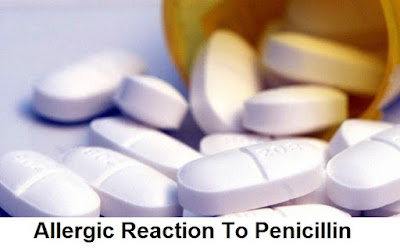Penicillin allergy is an allergic reaction that occurs when your body's immune system reacts very strongly to a penicillin medicine.
Common allergic reactions to penicillin are skin rash, hives, itchy eyes and swollen lips, tongue or face.
In some people, penicillin can even trigger an anaphylactic reaction, which can be fatal. This allergic reaction develops very quickly, usually within the hour after the penicillin was taken. Symptoms that an anaphylactic reaction can be recognized are respiratory problems, skin rash (if this rash appears to be measles, the chance of an anaphylactic reaction is small), shortness of breath, dizziness, loss of consciousness, accelerated or weakened pulse, blue skin, diarrhea, nausea and vomiting . Given the severity of an anaphylactic reaction, the use of medical assistance is recommended.
Penicillin allergy is the most common drug allergy. Yet penicillin allergy only occurs in 2 to 5% of the population.
Penicillin is found in many types of antibiotics. Fortunately, there are other types of antibiotics, without penicillin, but they can not always offer the solution. Some people who are allergic to penicillin may also be allergic to other closely related antibiotics.
People who have a positive result on a skin test for penicillin allergy, have itching after taking penicillin or have had an anaphylactic reaction before taking penicillin are likely to have an anaphylactic reaction in the future.
Yet people often mistakenly think that they are allergic to penicillin, because they only received an adverse reaction instead of an allergic reaction. For example, 80% of patients are mistaken and incorrectly prescribe another, much more expensive, antibiotic. This increases the risk of antibiotic resistance. A skin test is therefore the best way to find out if someone is really allergic to penicillin.
In an anaphylactic reaction, an adrenalin injection is usually recommended, but antihistamine or corticosteroids can also be administered via an infusion.
Patients who are already aware of their penicillin allergy can take preventive anti-histamine medications.
In order to prevent an anaphylactic reaction, other antibiotics without penicillin are prescribed or a therapy is made that makes the body immune to penicillin. They start with small amounts of penicillin and gradually increase the amount. In this way, the body can get used to the penicillin, without causing an allergic reaction.
What are the signs and symptoms of penicillin allergy?
Common allergic reactions to penicillin are skin rash, hives, itchy eyes and swollen lips, tongue or face.
In some people, penicillin can even trigger an anaphylactic reaction, which can be fatal. This allergic reaction develops very quickly, usually within the hour after the penicillin was taken. Symptoms that an anaphylactic reaction can be recognized are respiratory problems, skin rash (if this rash appears to be measles, the chance of an anaphylactic reaction is small), shortness of breath, dizziness, loss of consciousness, accelerated or weakened pulse, blue skin, diarrhea, nausea and vomiting . Given the severity of an anaphylactic reaction, the use of medical assistance is recommended.
How often does penicillin allergy actually occur?
Penicillin allergy is the most common drug allergy. Yet penicillin allergy only occurs in 2 to 5% of the population.
Penicillin is found in many types of antibiotics. Fortunately, there are other types of antibiotics, without penicillin, but they can not always offer the solution. Some people who are allergic to penicillin may also be allergic to other closely related antibiotics.
Which people are most at risk of severe penicillin allergy?
People who have a positive result on a skin test for penicillin allergy, have itching after taking penicillin or have had an anaphylactic reaction before taking penicillin are likely to have an anaphylactic reaction in the future.
Yet people often mistakenly think that they are allergic to penicillin, because they only received an adverse reaction instead of an allergic reaction. For example, 80% of patients are mistaken and incorrectly prescribe another, much more expensive, antibiotic. This increases the risk of antibiotic resistance. A skin test is therefore the best way to find out if someone is really allergic to penicillin.
How does one treat an allergic reaction to penicillin?
In an anaphylactic reaction, an adrenalin injection is usually recommended, but antihistamine or corticosteroids can also be administered via an infusion.
Patients who are already aware of their penicillin allergy can take preventive anti-histamine medications.
Allergic to penicillin what can i take?
In order to prevent an anaphylactic reaction, other antibiotics without penicillin are prescribed or a therapy is made that makes the body immune to penicillin. They start with small amounts of penicillin and gradually increase the amount. In this way, the body can get used to the penicillin, without causing an allergic reaction.

